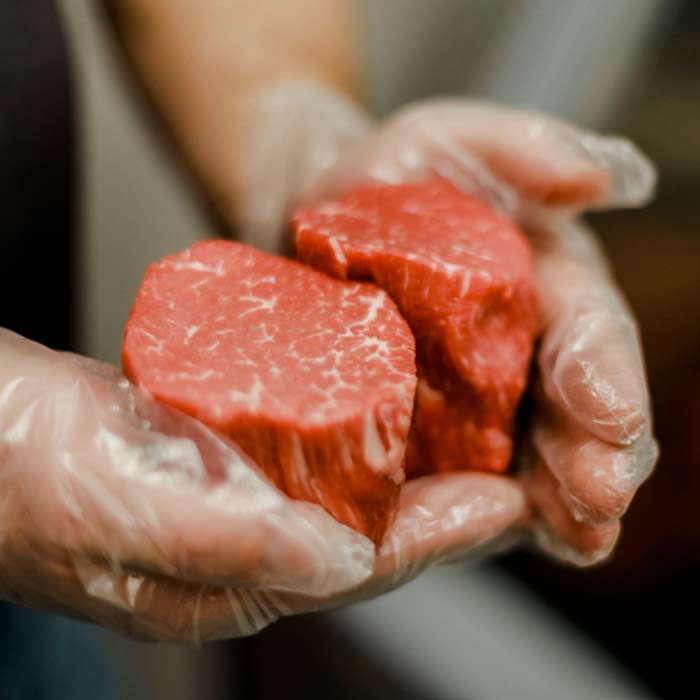The Complete Overview to Discovering Your Neighborhood Meat Market: Offerings and advantages
Checking out a neighborhood meat market can reveal a range of benefits that expand beyond simple shopping. These markets frequently give fresher and much more diverse choices compared to conventional food store. They likewise offer an opportunity to involve with well-informed personnel that can assist clients in their choices. However, the advantages do not stop there. Recognizing the wider ramifications of neighborhood sourcing might transform the way one approaches meat usage altogether. What various other understandings wait for those going to explore?
Recognizing the Value of Neighborhood Sourcing
Several customers might overlook the benefits, neighborhood sourcing in meat markets offers substantial benefits that expand past simple convenience. By purchasing meat from local suppliers, customers usually appreciate fresher products, as these meats are generally processed and marketed faster than those sourced from distant ranches. This freshness not only improves taste but likewise supports far better dietary worth
Moreover, regional sourcing contributes to the local economy, helping tiny farmers and services flourish while reducing the carbon footprint connected with long-distance transportation. Consumers can also get a deeper understanding of the sourcing methods, cultivating a link to the regional agricultural community. This transparency typically results in higher pet welfare standards, as local manufacturers are more probable to implement ethical methods. Ultimately, choosing in your area sourced meats encourages customers to make informed decisions that profit both their health and wellness and their neighborhood, creating a much more sustainable food system.
Discovering Distinct Cuts and Specialized Meats
Neighborhood meat markets often include distinct cuts and specialized meats that may not be found in bigger grocery store stores. These artisan offerings can include unusual selections, showcasing the diversity of local animals. Checking out these options allows consumers to uncover new flavors and support neighborhood farmers.
Neighborhood Artisan Offerings
What unique tastes and appearances wait for at a community meat market? Local artisan offerings offer a variety of unique cuts and specialized meats that satisfy varied cooking choices. From heritage breeds to dry-aged beef, customers can uncover top notch products not typically found in grocery stores. Craftsmen butchers usually focus on lasting and moral sourcing, making certain that meats are elevated humanely and with care. Special preparations, such as house-made sausages and charcuterie, display the abilities and imagination of regional artisans, inviting expedition and experimentation in home food preparation. Furthermore, seasonal offerings highlight local flavors, enabling customers to get in touch with their area and support local business. Welcoming these craftsmen items can elevate any type of dish and improve the overall eating experience.
Unusual Meat Varieties
Checking out the offerings at an area meat market discloses an appealing option of unusual meat selections that can raise cooking experiences. Unique cuts such as bison ribeye, lamb neck, and goat shoulder offer consumers the opportunity to experiment with tastes and textures that differ from conventional meats (meat markets edwardsville il). Specialized things like venison, wild boar, and also game birds provide a preference of the unique, appealing to adventurous tastes buds. Furthermore, these markets typically source sustainably elevated pets, ensuring high quality and moral techniques. Experienced butchers can suggest cooking approaches and pairings, enhancing the overall dining experience. By welcoming these unusual selections, home cooks can produce memorable meals that celebrate diverse cooking traditions and showcase the splendor of regional farming
The Significance of Sustainability in Meat Manufacturing
Sustainability in meat production plays an important function in shaping ethical farming methods and lowering environmental effect. By prioritizing local sourcing, consumers can support ranches that prioritize pet well-being and lasting techniques. This emphasis not only profits the ecosystem yet likewise promotes a more powerful connection in between manufacturers and their areas.
Honest Farming Practices
Just how do moral farming practices add to a more sustainable meat manufacturing system? These methods focus on animal welfare, ensuring that animals are elevated in gentle conditions. By offering pets with appropriate room, access to pasture, and an all-natural diet, moral farming enhances their health and health, resulting in higher-quality meat products. Moral farms usually carry out rotational grazing and other lasting strategies that advertise soil health and biodiversity. This technique decreases reliance on synthetic inputs and helps preserve regional environments. Furthermore, moral farming promotes a connection in between producers and consumers, motivating openness and liability in the food supply chain. Inevitably, these methods not only benefit pets but likewise contribute to a much more sustainable and resistant agricultural system.
Environmental Effect Reduction
As the demand for meat remains to increase, the relevance of minimizing environmental influences in meat manufacturing becomes increasingly noticeable. Conventional address meat production is linked to considerable greenhouse gas emissions, deforestation, and water deficiency. Sustainable methods, such as rotational grazing and incorporated crop-livestock systems, can mitigate these impacts by advertising soil health and wellness and reducing reliance on chemical inputs. Additionally, purchasing regional meat markets motivates manufacturers to embrace environmentally friendly methods, as consumers increasingly focus on sustainability. By selecting meat sources that focus on pet well-being and ecological stewardship, individuals can add to a much more lasting food system. Inevitably, understanding the environmental implications of meat manufacturing equips consumers to make informed options that support both their health and the earth's wellness.
Neighborhood Sourcing Benefits
While numerous consumers might not understand it, regional sourcing of meat substantially boosts sustainability in food manufacturing. By sustaining neighborhood farms, customers minimize the carbon footprint linked with long-distance transportation. Furthermore, neighborhood meat producers usually employ extra ecologically friendly and humane methods compared to massive commercial operations. This strategy promotes biodiversity and advertises pet welfare. Neighborhood sourcing enhances the regional economic climate by keeping funds within the area and encouraging sustainable farming practices. It also makes it possible for customers to develop a much deeper connection with their food resources, fostering openness in manufacturing techniques. Ultimately, prioritizing regional meat not just advantages specific wellness but also contributes positively to environmental sustainability, making it an accountable option for conscientious customers.

Structure Relationships With Your Butcher
Building a relationship with a neighborhood butcher can greatly enhance the meat-buying experience. Establishing a link cultivates trust, allowing customers to look for tailored recommendations customized to their cooking demands. An experienced butcher can offer insights into the best cuts for certain recipes, preparation strategies, and cooking times, changing an easy buying trip right into an educational experience.
Additionally, normal interactions can bring about exclusive offers or access to specialty items not offered to the public. A butcher who understands their customers is a lot more likely to focus on top quality and freshness, guaranteeing satisfaction with every purchase. Furthermore, this partnership can motivate a feeling of area, as consumers really feel much more attached to the local food network. Involving with a butcher not only improves the consumer's understanding of meat products yet likewise supports local companies, developing an equally advantageous partnership that prospers on count on and top quality service.
Tips for Picking the very best Meats
When selecting the best meats, consumers should concentrate on a number of vital aspects that assure both quality and flavor. Freshness is vital; meat ought to have a dynamic color and a tidy, pleasurable aroma. Customers meat companies that ship ought to also check out the marbling, as intramuscular fat improves inflammation and flavor. In addition, comprehending the cut is necessary; various cuts offer various cooking methods and recipes, so understanding the planned use can assist choices successfully.
Another crucial element is sourcing; purchasing from respectable suppliers or regional butchers usually means better criteria. Customers ought to ask concerning the meat's origin and any kind of techniques connected to pet welfare or feeding. Inspecting for correct packaging and storage at the market can suggest exactly how well the meat has been cared for. By considering these aspects, consumers can make informed choices that result in an extra gratifying cooking experience.
Supporting Regional Economic Climates and Communities
Supporting neighborhood economic situations and areas is an often-overlooked advantage of buying at local meat markets. When consumers choose to acquire from these facilities, they add straight to the income of local farmers, ranchers, and artisans. This assistance cultivates a link lasting agricultural system and reinforces local economic climates, as money invested in your area tends to circulate within the community, creating tasks and boosting local infrastructure.
Moreover, regional meat markets frequently resource their items from neighboring farms, reducing transport expenses and carbon impacts. This not only advertises environmental sustainability yet also enables customers to enjoy fresher, higher-quality meats.
On top of that, these markets commonly take part in community efforts, such as sponsoring neighborhood occasions or sustaining food financial institutions. By prioritizing regional meat markets, consumers play a vital function in supporting their neighborhoods and ensuring the survival of local business, which eventually enriches the social material of the area.
Regularly Asked Questions

What Are the Common Operating Hours of Regional Meat Markets?
Common operating hours for regional meat markets usually vary, however numerous open in between 7 AM and 9 AM, shutting between 5 PM and 7 PM. Some may likewise supply extended hours on weekend breaks for ease.
Do Neighborhood Meat Markets Deal Delivery Solutions?
Lots of local meat markets do offer shipment services, although availability differs by place. Customers ought to inquire straight with their neighborhood market to verify whether this service is provided and any kind of connected fees or conditions.
Exist Vegetarian Options Available at Meat Markets?
Many regional meat markets do supply vegan alternatives, such as plant-based sausages, marinaded veggies, and specialized cheeses. These choices deal with diverse nutritional choices, interesting both meat fans and those looking for meat options.
How Can I Locate a Local Meat Market Near Me?


To locate a neighborhood meat market, one can search online through directory sites or maps, ask next-door neighbors for suggestions, or check out neighborhood farmers' markets that often feature vendors concentrating on meat items.
What Payment Techniques Do Regional Meat Markets Accept?
Local meat markets normally approve various settlement approaches, consisting of debit, credit scores, and money cards. Some may also provide mobile repayment choices or loyalty programs, improving benefit and encouraging repeat business among their clients.
By purchasing meat from local suppliers, consumers usually appreciate fresher items, as these meats are typically refined and marketed more quickly than those sourced from far-off farms. Local meat markets frequently include special cuts and specialized meats that might not be located in bigger grocery shops. Checking out the offerings at a community meat market reveals an interesting selection of unusual meat ranges that can elevate cooking experiences - meat market delivery. As the demand for meat proceeds to increase, the value of minimizing environmental effects in meat production ends up being increasingly noticeable. Sustaining neighborhood economic climates and communities is an often-overlooked benefit of buying at neighborhood meat markets